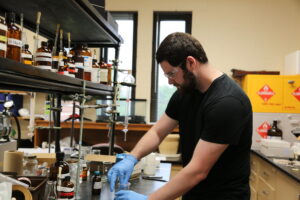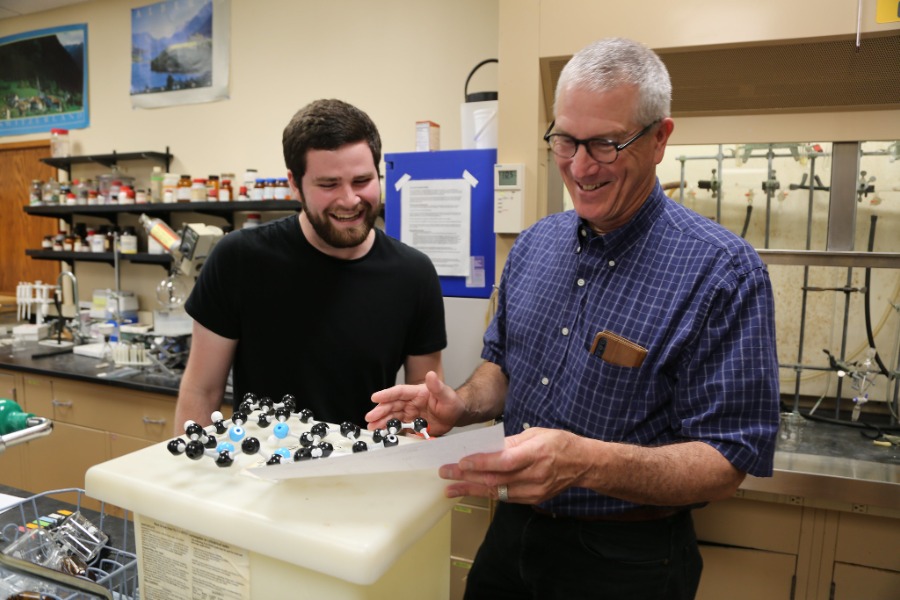Elizabethtown College Biochemistry and Molecular Biology major Will Davis ’24 is back to work in the Musser labs, expanding on his previous summer research on new methods of synthesizing substituted porphyrins. The study aims to develop highly specific molecules (porphyrins), which help encourage therapies that include accurately targeting and destroying cancer cells or treating various skin conditions while continuing to preserve healthy cells.
It marks the second straight year that Will is participating in this independent student research and collaboration with an Etown faculty mentor as part of the Summer Creative Arts and Research Program (SCARP) program.
Title of Research
Synthesis of hetero-substituted tetraphenylporphyrins
Student Researcher
Will Davis ’24 (Biochemistry and Molecular Biology major)
Faculty Mentor
Thomas Hagan, Associate Professor of Chemistry
What are you researching?
Will: Porphyrins can be used as a therapeutic in photodynamic therapy, however, one of the main difficulties with this treatment is getting the porphyrin into the cell. To overcome this challenge, we are synthesizing an asymmetrically substituted porphyrin that allows for the controllable attachment of fatty acid-like compounds. By controlling the type of compound and how many are attached, we can also control the solubility and lipophilicity of the porphyrin, which is crucial for passing through the lipid bilayer.
Why did you choose this topic?
Will: I’m a pre-med student, and I wanted to perform hands-on research for the chemistry department. When I first heard about Dr. Hagan’s research, I was very interested because the topic coincides with many aspects of the medical field. In addition to lab experience, this area of research continues to grow my understanding of cell biology, especially the plasma membrane, and how pharmaceutical companies design medications.
What is the most interesting aspect of this research?
Will: The most interesting part of this research is all the different ways that porphyrins can be introduced into a cell. When I first started this project after my first year at Etown, I thought that the cell membrane and delivery of therapeutics was very straightforward. However, now that I am able to grasp the complexity of the situation, it has given me a much deeper appreciation for how the human body was designed.
How have your mentors helped you?
Will: Dr. Hagan not only teaches me practical lab skills, but he also uses SCARP to teach me about important traits for aspiring physicians and to develop my skill set in areas outside of the lab, such as writing and presenting. Dr. Hagan always has a good sense of humor as well, so even the monotonous days are upbeat and entertaining.
Hear from the faculty mentor – Thomas Hagan
“Will did a fantastic job last year learning the lab fundamentals of his project, and this summer he has just taken off with the project,” Hagan said. “I very much appreciate that while he is not going to be a biochemistry researcher, his level of critical thinking is at an exceptionally high level.
“To engage students in the research experience outside of their formal course structure is truly an incredible opportunity that more students should take advantage of through SCARP. Students get to witness the scientific method at work, and they learn the necessity of carefully evaluating experiment design and results to move a project forward.”

